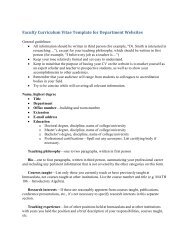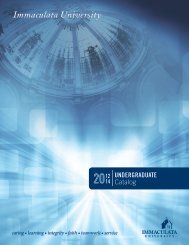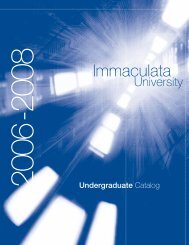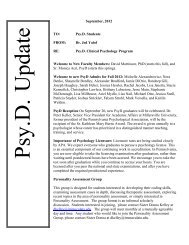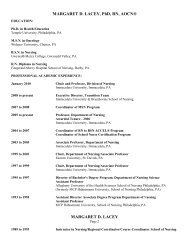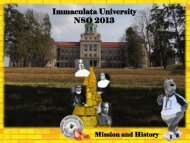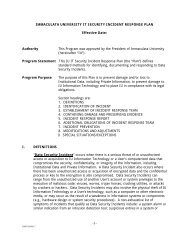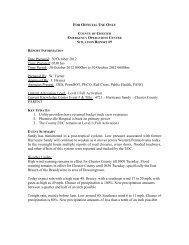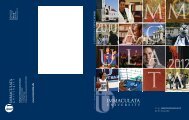Undergraduate Catalog 2008-2010 - Immaculata University
Undergraduate Catalog 2008-2010 - Immaculata University
Undergraduate Catalog 2008-2010 - Immaculata University
Create successful ePaper yourself
Turn your PDF publications into a flip-book with our unique Google optimized e-Paper software.
CHE 103 Fundamental Chemical Concepts I (4)<br />
A systematic study of the theories and principles governing the<br />
composition and behavior of matter. 3 hours lecture, 3 hours<br />
laboratory. Pre- or Co- requisite: MATH 207 or MATH 301.<br />
Prerequisite: Secondary school chemistry with at least a B grade or<br />
permission of the instructor.<br />
CHE 104 Fundamental Chemical Concepts II (4)<br />
A systematic study of the theories and principles governing the<br />
composition and behavior of matter. 3 hours lecture, 3 hours<br />
laboratory. Pre- or Co- requisite: MATH 208 or MATH 302.<br />
Prerequisite: Secondary school chemistry with at least a B grade or<br />
permission of the instructor. (Prerequisite: CHE 103)<br />
CHE 105 Forensic Science I (3)<br />
An introduction to the terminology and techniques used in<br />
forensic science. The course will include basic, analytical, and<br />
organic chemistry as applied to DNA evidence, trace analysis,<br />
laboratory equipment, analysis of data, crime scene analysis and<br />
other relevant forensic topics. (Fulfills core requirement.) 2 hours<br />
lecture, 2 hours laboratory.<br />
CHE 106 Forensic Science II (3)<br />
An introduction to the terminology and techniques used in<br />
forensic science. The course will include basic, analytical, and<br />
organic chemistry as applied to DNA evidence, trace analysis,<br />
laboratory equipment, analysis of data, crime scene analysis and<br />
other relevant forensic topics. (Fulfills core requirement.) 2 hours<br />
lecture, 2 hours laboratory. (Prerequisite: CHE 105)<br />
CHE 110 Lab Techniques in Chemistry (1)<br />
A two-hour introductory laboratory for those who need a one<br />
credit laboratory course.<br />
CHE 112 Topics in Education (1-3)<br />
Special topics courses focusing on aspects of science and<br />
chemistry. May be used to satisfy Act 48 hours.<br />
CHE 200 Chemical Literature (3)<br />
An introduction in how to retrieve and understand chemical<br />
information from print and electronic sources. Discussion topics<br />
will include: the process of conducting research in chemistry, grant<br />
writing, manuscript preparation, the process of peer review, major<br />
publishers of chemical literature, different types of journals, and the<br />
various types of publications. The course will survey current<br />
chemical issues and research. 3 hours lecture.<br />
CHE 201 Introductory Organic Chemistry (3)<br />
A basic course in the study of carbon compounds. 2 hours<br />
lecture, 2 hours laboratory. (Open to students who are not<br />
concentrating in chemistry.) (Prerequisite: CHE 101-102 or 103-<br />
104)<br />
CHE 202 Introductory Biochemistry (3)<br />
An introduction to the study of lipids, proteins, carbohydrates,<br />
and nucleic acids in relation to metabolism. 2 hours lecture, 2 hours<br />
laboratory. (Open to students who are not concentrating in<br />
chemistry.) (Prerequisite: CHE 201)<br />
CHE 211 Organic Chemistry I (4)<br />
A comprehensive study of the structure, reactions, and reaction<br />
mechanisms of organic compounds. 3 hours lecture, 3 hours<br />
laboratory (Microscale). (Prerequisite: CHE 103-104)<br />
CHE 212 Organic Chemistry II (4)<br />
A comprehensive study of the reactions and mechanisms of<br />
organic compounds with an emphasis on synthesis and how<br />
molecular structure effects reactivity. 3 hours lecture, 3 hours<br />
laboratory (Microscale). (Prerequisite: CHE 211)<br />
CHE 303 Independent Study (1-6)<br />
Independent study of advanced topics in chemistry with<br />
permission and guidance of a Chemistry Department faculty<br />
member.<br />
CHE 304 Instrumental Analysis (4)<br />
Gravimetric, volumetric, and instrumental analysis with<br />
emphasis on application of analytical separation techniques. 2<br />
hours lecture, 4 hours laboratory. (Prerequisite: CHE 103-104 and<br />
CHE 211-212)<br />
CHE 310 Structural Organic Analysis (3)<br />
Qualitative organic chemistry presented via a spectroscopic<br />
methodology supplemented by classical chemical and physical<br />
techniques. Topics include mass spectrometry, infrared<br />
spectroscopy, 1&2D NMR, multi-nuclear NMR, advanced NMR<br />
methods, and electron spin resonance (ESR). 3 hours lecture.<br />
(Prerequisite: CHE 211-212)<br />
CHE 313 Physical Chemistry I (4)<br />
A qualitative and quantitative study of the properties of bulk<br />
matter. Classical chemical thermodynamics, fundamental<br />
thermodynamic functions, 1st, 2nd, and 3rd laws, electrochemistry,<br />
equilibria, properties of solutions, colligative properties, application<br />
of thermodynamics to biological processes, and chemical kinetics.<br />
3 hours lecture, 3 hours laboratory. (Prerequisite: CHE 211-212)<br />
CHE 314 Physical Chemistry II (4)<br />
A qualitative and quantitative study of the microscopic<br />
properties of matter. Statistical thermodynamics, partition functions,<br />
Quantum mechanics, chemical bonding, molecular symmetry/group<br />
theory, spectroscopy, IR, Raman, ESR, and NMR. CHE 313 is not<br />
a prerequisite. 3 hours lecture, 3 hours laboratory. (Prerequisite:<br />
CHE 211-212)<br />
CHE 315 Physical Chemistry III (3)<br />
A study of the solid state, chemical processes at surfaces, and<br />
the role of photochemistry and photobiology. 3 hours lecture.<br />
(Prerequisite: CHE 313-314)<br />
CHE 317 History of Chemistry (1)<br />
The evolution of chemistry from alchemy to nuclear reactions.<br />
1 hour lecture.<br />
CHE 318 Advanced Organic Chemistry (3)<br />
Physical organic chemistry, the thermodynamic and kinetic basis<br />
for organic reactions. Mechanisms of organic reactions and,<br />
methods for studying them. 3 hours lecture. (Prerequisite: CHE<br />
211-212)<br />
CHE 320 Inorganic Chemistry (3)<br />
In depth study of atomic and molecular structure related to metal<br />
and metalloid compounds. Review of acids and bases. Study of the<br />
structure and reactivity of the main group elements, transition metal,<br />
and organometallic complexes and compounds. Use of<br />
spectroscopic data in interpreting structure and reactivity of<br />
inorganic compounds. 3 hours lecture. (Prerequisite: CHE 313)<br />
53




